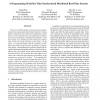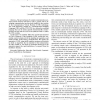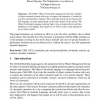239 search results - page 24 / 48 » Using Event Semantics for Modeling Contracts |
118
Voted
RTAS
2007
IEEE
15 years 8 months ago
2007
IEEE
Discrete-event (DE) models are formal system specifications that have analyzable deterministic behaviors. Using a global, consistent notion of time, DE components communicate via...
107
click to vote
COMPSAC
2009
IEEE
15 years 7 months ago
2009
IEEE
Abstract—The pervasiveness of complex communication services and the need for end-users to play a greater role in developing communication services have resulted in the creation ...
135
click to vote
JAIR
2007
15 years 2 months ago
2007
Matchmaking arises when supply and demand meet in an electronic marketplace, or when agents search for a web service to perform some task, or even when recruiting agencies match c...
131
click to vote
ICCD
1995
IEEE
15 years 6 months ago
1995
IEEE
Symbolic model checking is a successful technique for checking properties of large finite-state systems. This method has been used to verify a number of real-world hardware desig...
144
Voted
UML
2000
Springer
15 years 6 months ago
2000
Springer
The UML's Object Constraint Language provides the modeller of object-oriented systems with ways to express the semantics of a model in a precise and declarative manner. The co...



